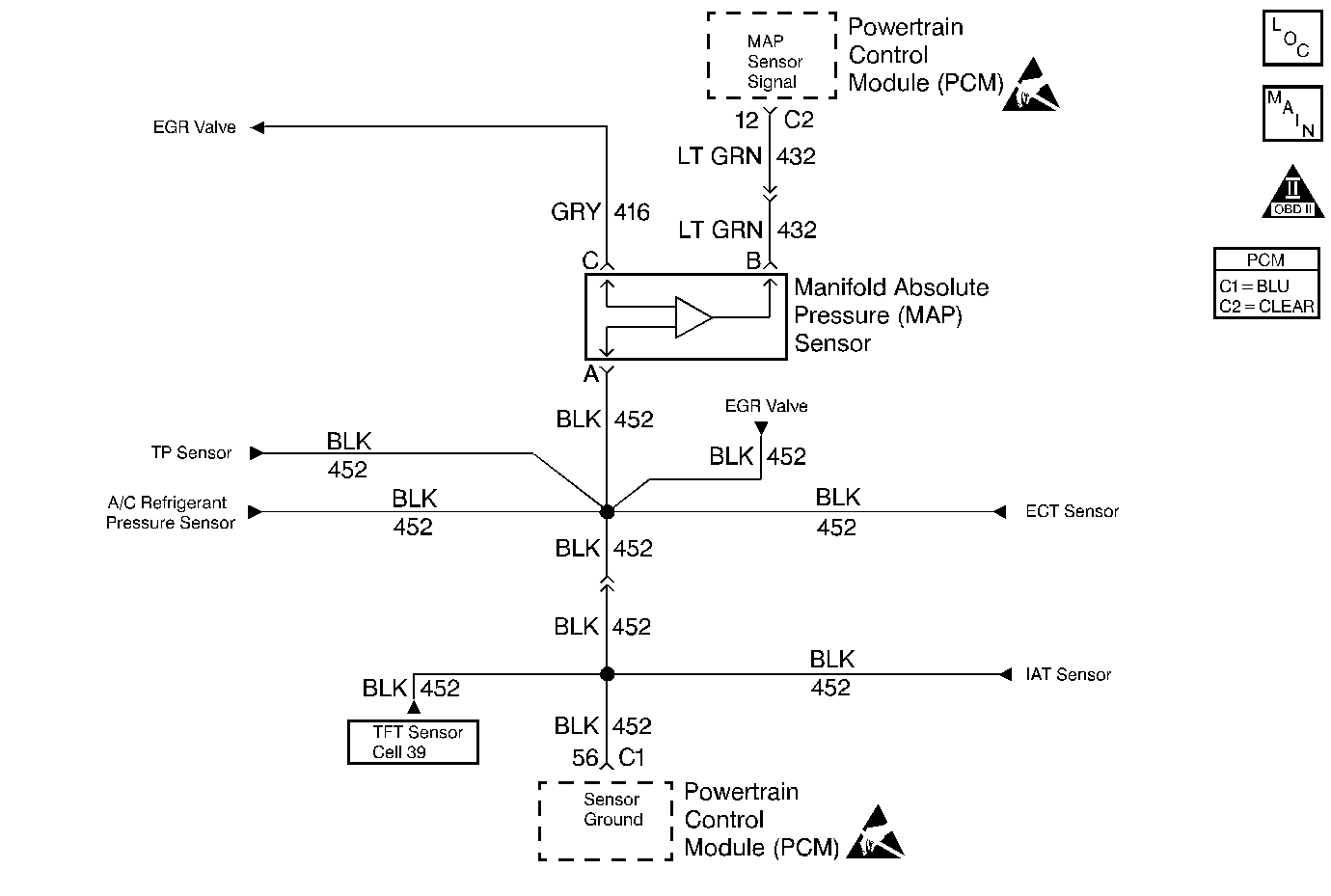
Circuit Description
The Manifold Absolute Pressure (MAP) sensor responds to changes in intake manifold pressure (vacuum). The MAP sensor signal voltage to the PCM varies from below 2 volts at idle (high vacuum) to above 4 volts with the key ON, engine not running or at wide-open throttle (low vacuum). The MAP sensor is used to determine manifold pressure changes while the linear EGR flow test diagnostic is being run (refer to DTC P0401), to determine engine vacuum level for some other diagnostics and to determine barometric pressure (BARO). The PCM compares the MAP sensor signal to a calculated MAP based on throttle position and various engine load factors. If the PCM detects a MAP signal that varies excessively with no comparative change in engine load, DTC P0106 will set.
Conditions for Setting the DTC
| • | No TP sensor DTCs present. |
| • | Engine speed steady. |
| • | Throttle position steady. |
| • | IAC valve counts steady. |
| • | EGR flow rate steady. |
| • | Brake switch state steady. |
| • | A/C clutch state steady. |
| • | MAP value changes significantly with no change in load. |
| • | The above conditions are present for longer than 200 3X reference periods (67 crankshaft revolutions). |
Action Taken When the DTC Sets
| • | The PCM will illuminate the malfunction indicator lamp (MIL) during the second consecutive trip in which the diagnostic test has been run and failed. |
| • | The PCM will store conditions which were present when the DTC set as Freeze Frame and Failure Records data. |
Conditions for Clearing the MIL/DTC
| • | The PCM will turn OFF the MIL during the third consecutive trip in which the diagnostic has been run and passed. |
| • | The History DTC will clear after 40 consecutive warm-up cycles have occurred without a malfunction. |
| • | The DTC can be cleared by using the scan tool. |
Diagnostic Aids
Check for the following conditions:
| • | Poor connection at the PCM. Inspect harness connectors for backed out terminals, improper mating, broken locks, improperly formed or damaged terminals, and poor terminal to wire connection. |
| • | Damaged harness. Inspect the wiring harness for damage. If the harness appears to be OK, observe the MAP display on the scan tool while moving connectors and wiring harnesses related to the sensor. A change in the display will indicate the location of the malfunction. |
If DTC P0108 cannot be duplicated, the information included in the Fail Records data can be useful in determining since the DTC was last set. If it is determined that the DTC occurs intermittently, performing the DTC P1108 Diagnostic Chart may isolate the cause of the malfunction.
Test Description
Number(s) below refer to the step number(s) on the Diagnostic Table:
Step | Action | Value(s) | Yes | No | ||||||||||||
|---|---|---|---|---|---|---|---|---|---|---|---|---|---|---|---|---|
1 | Was the Powertrain On-Board Diagnostic (OBD) System Check performed? | -- | ||||||||||||||
2 |
Important: If DTC P1635 is set, diagnose the other DTC first. Refer to DTC P1635 5 Volt Reference Circuit .
Does the scan tool indicate DTC P0106 failed? | -- | ||||||||||||||
3 |
Was a problem found? | -- | Go to Diagnostic Aids | |||||||||||||
4 |
Is MAP value near the specified value? | 0V | ||||||||||||||
5 |
Is MAP value near the specified value? | 4.95V | ||||||||||||||
6 |
Is MAP value near the specified value? | 4.95V | ||||||||||||||
7 |
Was a problem found? | -- | ||||||||||||||
8 |
Was a problem found? | -- | ||||||||||||||
9 |
Was a problem found? | -- | ||||||||||||||
10 |
Was a problem found? | -- | ||||||||||||||
11 |
Was a problem found? | -- | ||||||||||||||
12 | Replace the MAP sensor.
Is action complete? | -- | -- | |||||||||||||
13 |
Was a problem found? | -- | ||||||||||||||
Replace the PCM. Important:: The replacement PCM must be programmed. Refer to Powertrain Control Module Replacement/Programming . Is action complete? | -- | -- | ||||||||||||||
15 |
Does scan tool indicate DTC P0106 failed? | -- | System OK |
